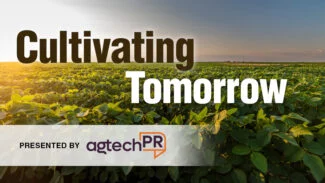Cultivating Tomorrow: AgTech Leader Speaks About Understanding the Changing Needs of Farmers for New Revenue Stream


By Andrew Duff | December 2, 2024
Editor’s note: “Cultivating Tomorrow” is a special series that shares insights from C-suite executives at leading AgTech companies, presented by AgTech PR. Its aim is to highlight the experiences of AgTech leaders driving agricultural transformation today. In this installment, Andrew Duff, North American General Manager for Groundwork BioAg, discusses why we are at a crossroads in advancing a carbon credit solution for farmers. To move forward, we must ensure farmers get their fair share of the value.
Selling carbon credits generated from farmland is gaining ground in North America. That’s good news for U.S. farmers looking for new revenue.
Both the grower and the carbon buyer are motivated right now to engage in the carbon credit conversation.
On the buyer side, consumer pressure is driving increased interest in high-value, nature-based carbon removal solutions that come with environmental co-benefits, like reduced water and input use and increased climate resiliency. That bodes well for the supply-side demand from carbon credit buyers for credits generated from agricultural soil.
For farmers, carbon credits offer the potential of new revenue when farmer income is dropping at alarming rates. September reports from the United States Department of Agriculture (USDA) projected a 23% drop in farm income over the last two years.
Case in point, outside of Memphis, TN, Elon Musk has installed a new, massive AI data center, billed as the world’s largest supercomputer, emitting significant CO2 emissions from its copious electricity use. To offset that climate impact, Musk will need to aggressively pursue carbon reduction measures. Meanwhile, within a 60-mile radius, there are farms suffering from shrinking profit margins. Two problems that could be solved with one solution, leveraging farmland to generate a new carbon credit asset class.
I believe we are at a unique point in time to build a viable agricultural carbon credit marketplace, if we commit to ensuring farmers get their fair share of the value.
Alignment Across the Carbon Credit Value Chain Must Include the Farmer
Many well-intended carbon programs of the past few years have failed to gain ground because they missed the first step in the value chain process – the farmer. These programs might have sounded good, but economically, they were challenging for farmers to implement.
It has become clear that programs that have an ‘either/or’ equation, as in either maximize yields or sequester carbon, simply haven’t been worth the risk for the farmer. We must not forget that yield is table stakes. Carbon credit programs should generate additional revenue, not replace the primary way farmers pay their bills.
This is the role science and tech can play in value creation. We can unlock new value without eliminating the old. For instance, enabling innovation like mycorrhizal inoculants that improve yields and sequester carbon without requiring a change in farming practices is the type of win/win value creation that incentivizes grower participation.
Education and Realistic Expectations Needed to Understand the Value of Agricultural Carbon Sequestration
On the buyer’s side, we must focus on education that validates the value of farmland carbon offsets. We can’t expect them to understand that value on their own. It’s on the value chain, including program developers like Groundwork BioAg, to ensure the carbon credits we offer up for sale are well worth their value, with the documentation to prove it.
But to connect those dots, we need a stronger commitment to scientific collaboration. Establishing independent research initiatives — particularly through land-grant universities — would go a long way toward providing a trusted, unbiased expertise approach and driving forward the science necessary to create the framework supporting high-value, sought-after carbon credits that return good money to farmers.
As we push forward with these initiatives, we must also set realistic expectations. For instance, while there have been promising developments in carbon credit sequestration methodologies, we are still in the early stages of the market’s evolution. Farmers and buyers need to be prepared for gradual changes rather than immediate solutions; rushing to market without adequate preparation will lead to disillusionment on both sides.
Even so, the potential is well worth it.
Through my daily interaction with farmers participating in Groundwork BioAg’s Rootella Carbon program, I believe we are at a crossroads in advancing a carbon credit solution for farmers. We must now move forward with an end-to-end solution that is easy for all parties to participate in, trustworthy and shares the value according to the role played. Especially for the most critical partner in the entire process – the farmer.
A Mississippi Delta farming native, Andrew Duff is the North American General Manager for Groundwork BioAg, an industry leader in mycorrhizal inoculants. Duff oversees the growth of the Groundwork BioAg Rootella product portfolio with North American distribution partners and growers. Duff works together with farmers participating in the Rootella Carbon program launched to U.S. growers in October 2023 to help farmers generate, verify and sell carbon credits on the voluntary carbon credit market.
________________________________________________________________________________________________________________

